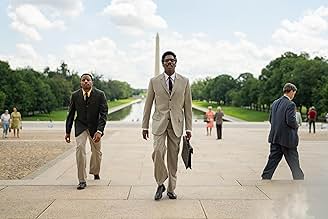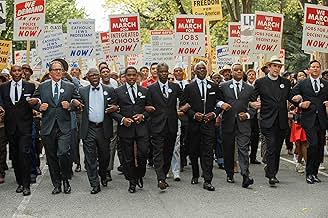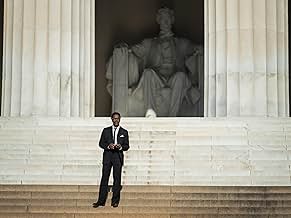Activist Bayard Rustin faces racism and homophobia as he helps change the course of Civil Rights history by orchestrating the 1963 March on Washington.Activist Bayard Rustin faces racism and homophobia as he helps change the course of Civil Rights history by orchestrating the 1963 March on Washington.Activist Bayard Rustin faces racism and homophobia as he helps change the course of Civil Rights history by orchestrating the 1963 March on Washington.
- Nominated for 1 Oscar
- 14 wins & 66 nominations total
Featured reviews
Rustin is another extremely conventional biopic about a person who was anything but that. It remains really good thanks to a central performance more than capable of single-handedly carrying the film and the fact that its story, even when told conventionally, is incredibly powerful.
Shining a spotlight on someone who did the extraordinary without being remembered like his peers, Colman Domingo delivers a perfect performance that's endlessly charming. Dustin Lance Black and Julian Breece create a screenplay that gives Domingo plenty of speeches which he performs in a way that never feels showy, always heartfelt and real.
The best aspect of George C. Wolfe's direction is the pacing. It moves fast without ever feeling rushed and is always further ahead than it seems. Branford Marsalis' jazz heavy score really works, reflecting the chaos of trying to arrange a march of this scale as well as the way all the leaders bounce off each other.
Shining a spotlight on someone who did the extraordinary without being remembered like his peers, Colman Domingo delivers a perfect performance that's endlessly charming. Dustin Lance Black and Julian Breece create a screenplay that gives Domingo plenty of speeches which he performs in a way that never feels showy, always heartfelt and real.
The best aspect of George C. Wolfe's direction is the pacing. It moves fast without ever feeling rushed and is always further ahead than it seems. Branford Marsalis' jazz heavy score really works, reflecting the chaos of trying to arrange a march of this scale as well as the way all the leaders bounce off each other.
I always love it when the unsung heroes of history get their fair due - I must admit that I did not know much about Rustin before this biopic.
I think the beginning was fabulous, it had great speed and the camerawork was good but then for me it somehow did not balance well the depiction of the work and his personal life. Also, I hoped the events of the march would be portrayed more but it was somehow almost like pushed in quickly into the last 5 minutes of the movie with no real culmination.
Also, what is it with Americans never acknowledging the rest of the world? In the end it says something like "...with 250 000 people making it the biggest peaceful protest to date." Is it so hard to add "in America" in the end? E.g. The Baltic Way in 1989 when 2 million people from Estonia, Latvia, Lithuania joined hands to form the longest unbroken human chain in history to protest their illegal occupation by the Soviet Union in 1940 after the Molotov-Ribbentrop pact in 1939? As a history-enthusiast I just don't like such half-true statements being put out there.
Otherwise, solid movie with a very good lead and I think it is important that more people get to know about those who have thought for the rights of all.
I think the beginning was fabulous, it had great speed and the camerawork was good but then for me it somehow did not balance well the depiction of the work and his personal life. Also, I hoped the events of the march would be portrayed more but it was somehow almost like pushed in quickly into the last 5 minutes of the movie with no real culmination.
Also, what is it with Americans never acknowledging the rest of the world? In the end it says something like "...with 250 000 people making it the biggest peaceful protest to date." Is it so hard to add "in America" in the end? E.g. The Baltic Way in 1989 when 2 million people from Estonia, Latvia, Lithuania joined hands to form the longest unbroken human chain in history to protest their illegal occupation by the Soviet Union in 1940 after the Molotov-Ribbentrop pact in 1939? As a history-enthusiast I just don't like such half-true statements being put out there.
Otherwise, solid movie with a very good lead and I think it is important that more people get to know about those who have thought for the rights of all.
The prevailing thought I had watching Rustin was that the events depicted were probably exactly how they happened in real life. If this were a documentary that'd be fine but as an actual narrative it just made the whole thing feel very surface level. It has none of the style of movies like Selma or BlackkKlansman which made their depictions of this period so captivating to watch. I don't think the film tackles the civil rights issue in any interesting way and while Bayard Rustin's story absolutely deserves to be told I don't think its importance comes through in the finished product. The whole march that the film is building up to just comes and goes before it has a chance to have any impact. Colman Domingo is great, he absolutely does justice to this character and makes the film at least watchable but he deserved a much better script. An important story in and of itself doesn't create for a good narrative without any kind of vision and that's sorely what Rustin was lacking for me.
Unsung heroes often don't get their day. Fortunately, however, for civil rights activist Bayard Rustin (Colman Domingo), principal organizer of the 1963 March on Washington, he's finally getting his due in this new biopic about the many challenges he faced in bringing this event into being. The flamboyant, outspoken, Black gay organizer faced much opposition to his proposal, including, surprisingly enough, from an African-American community that was apprehensive about the message his appointment and presence would send to a still-reluctant public in its support for equal rights measures, including such noteworthy figures as NAACP leader Roy Wilkins (Chris Rock) and Congressman Adam Clayton Powell Jr. (Jeffrey Wright). Things were even tense at times between Rustin and his longtime friend, Dr. Martin Luther King Jr. (Aml Ameen), for whom Rustin once served as his chief aide and advisor. Then there was Rustin's sexual orientation, a matter he didn't exactly hide, especially in his less-than-discreet relationship with married preacher Elias Taylor (Johnny Ramey), something other activists feared could undo all the progress they had made up to that time. But, as a determined champion, Rustin forged ahead, despite these hardships, culminating in the largest peaceful protest ever staged in the nation's capital. To the film's credit, director George C. Wolfe has compiled an informative period piece biography, even if the approach is somewhat conventional and, admittedly, gets off to a rather rocky start in the first half hour. However, that's made up for by a strong second half and the picture's powerhouse cast, including Domingo (a strong Oscar nominee contender), Wright and Ameen, as well as Glynn Turman and CCH Pounder in fine supporting performances. While this offering may not be everything it could have been, "Rustin" nevertheless reminds us of what so many people fought so hard to achieve - and why it's so important that we strive to protect those accomplishments against backsliding and those who might seek to undermine the fulfillment of those much-cherished attainments.
It's a narrowly focused biopic on Bayard Rustin's (Colman Domingo) lead role in planning the famous 1963 March of Washington for Jobs and Freedom. The film opens with scant background about the Civil Rights movement, Rustin's friendship with Martin Luther King Jr. (Aml Ameen), and the subsequent temporary break in their relationship in 1960 when rumors surface about a possible sexual relationship because of Rustin's known homosexuality.
The bulk of the movie then shifts to Rustin's drive in 1963 to make the March on Washington happen despite the resistance of some Civil Rights leaders like Roy Wilkins (Chris Rock) and Adam Clayton Powell Jr. (Jeffrey Wright). "Rustin" also highlights the complexities caused in that era because of Rustin's relationships with his assistant, Tom Kahn (Gus Halper), and a married minister, Elias Taylor (Johnny Ramey). Many prominent Civil Rights and union leaders appear briefly as characters in the film.
"Rustin" is a brave attempt to honor an often-forgotten Civil Rights leader. Colman Domingo is excellent. He portrays a gifted, extroverted organizer who is unapologetic about his sexuality but recognizes the danger his orientation presents to the movement. Ameen, Rock, and Wright are also good in their roles, as is CCH Pounder as labor organizer Anna Hedgeman.
"Rustin" begs for more background on why Rustin was so important to Martin Luther King Jr. Rustin, a Quaker pacifist, had an enormous impact on King's emerging philosophy of non-violent resistance. This impact is inadequately addressed. Also, more history on Rustin's philosophical development, marginally hinted at in a few flashbacks, would have strengthened the story.
Nonetheless, "Rustin" is worth an evening's watch.
The bulk of the movie then shifts to Rustin's drive in 1963 to make the March on Washington happen despite the resistance of some Civil Rights leaders like Roy Wilkins (Chris Rock) and Adam Clayton Powell Jr. (Jeffrey Wright). "Rustin" also highlights the complexities caused in that era because of Rustin's relationships with his assistant, Tom Kahn (Gus Halper), and a married minister, Elias Taylor (Johnny Ramey). Many prominent Civil Rights and union leaders appear briefly as characters in the film.
"Rustin" is a brave attempt to honor an often-forgotten Civil Rights leader. Colman Domingo is excellent. He portrays a gifted, extroverted organizer who is unapologetic about his sexuality but recognizes the danger his orientation presents to the movement. Ameen, Rock, and Wright are also good in their roles, as is CCH Pounder as labor organizer Anna Hedgeman.
"Rustin" begs for more background on why Rustin was so important to Martin Luther King Jr. Rustin, a Quaker pacifist, had an enormous impact on King's emerging philosophy of non-violent resistance. This impact is inadequately addressed. Also, more history on Rustin's philosophical development, marginally hinted at in a few flashbacks, would have strengthened the story.
Nonetheless, "Rustin" is worth an evening's watch.
Did you know
- TriviaOne of the producing partners for this movie is Higher Ground Productions, the banner under which former president Barack and former first lady Michelle Obama have produced several Netflix projects. While Obama was president of the United States, he posthumously awarded Bayard Rustin the Presidential Medal of Freedom, the nation's highest civilian honor. At the November 20, 2013, White House ceremony, President Obama presented Rustin's award to Walter Naegle, Rustin's surviving longtime romantic partner.
- GoofsSeveral times, there is a reference to the subway in DC. The subway system there wasn't built until 1976.
- Quotes
Bayard Rustin: On the day that I was born black, I was also born a homosexual. They either believe in freedom and justice for all, or they do not.
- ConnectionsFeatured in CBS News Sunday Morning with Jane Pauley: Episode #45.56 (2023)
- SoundtracksShotgun
Written by Junior Walker (as Autry DeWalt)
Performed by Jr. Walker and the All Stars (as Junior Walker and the Allstars)
Courtesy of Motown/Universal
- How long is Rustin?Powered by Alexa
Details
- Runtime
- 1h 46m(106 min)
- Color
- Sound mix
- Aspect ratio
- 2.35 : 1
Contribute to this page
Suggest an edit or add missing content







































